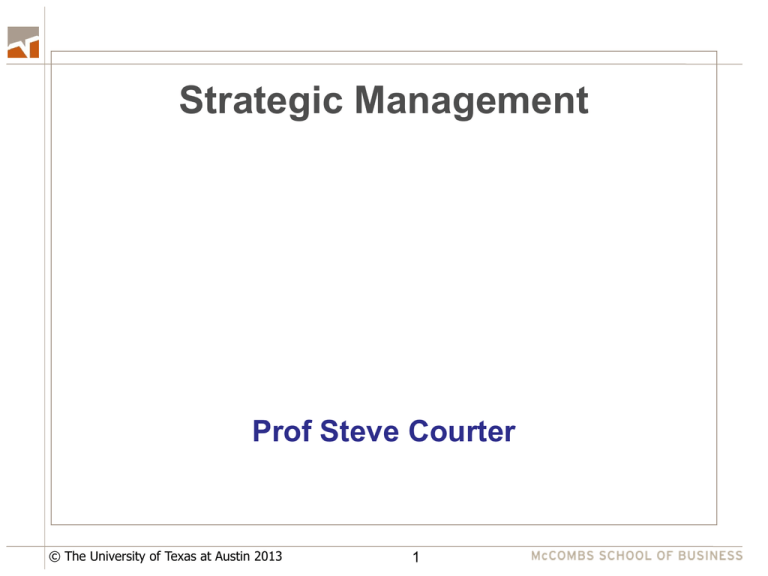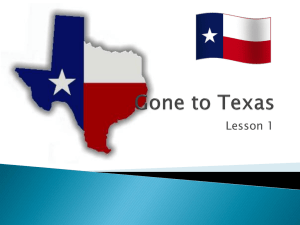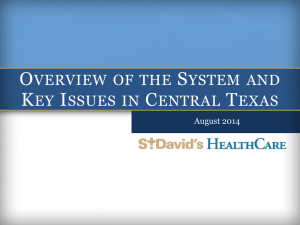Strategic Management
advertisement

Strategic Management Prof Steve Courter © The University of Texas at Austin 2013 1 The Classics Strategy Planning Process Modern firms engage in Strategic Planning to remain competitive Define objectives Assess environment Internal External Formulate Strategy Implement Strategy Evaluate progress Adjust © The University of Texas at Austin 2013 Mission & Objectives Environmental Scanning Evaluation and Control Strategy Formulation Strategy Implementation How Strategy has evolved Macro level shifts in the Global and US economies Agriculture –to Manufacturing –to Technologies and Services Short life-cycles Short development cycles Minimal capital investments Lower barriers to entry Resulting in more dynamic and intricate transactions © The University of Texas at Austin 2013 Michael Porter’s Definition of Strategy Creating a unique and valuable position That the core of a Strategy is never imitating anyone Strategic positioning comes from three distinct sources Serving the few needs of many customers (Jiffy Lube) Serving the broad needs of a few customers (J.P. Morgan’s Private Bank) Serving the broad needs of many customers in a narrow market (Ikea) © The University of Texas at Austin 2013 Strategy is… You must make trade-offs in competing and chose what not to do You cannot be all things to all customers and create a unique, sustainable, competitive position You must create a fit among all of your firm’s activities Being disciplined and making clear choices Being different versus being efficient © The University of Texas at Austin 2013 Strategy is not… Operational efficiency An aspiration To be #1 or #2 a la Jack Welch of GE This is a goal. How you accomplish that goal is a strategy A vision To reach $60 billion in revenue in 2014 is a goal Whose market share you take to get there is a strategy © The University of Texas at Austin 2013 Strategy is not … Innovation The Internet Any form of technology Experimentation Flexibility Nimbleness Agility Change Re-engineering Execution © The University of Texas at Austin 2013 Who uses Strategic Management? Board Investors Analysts Employees Consultants Legal Support Competition Governments Vendors/Suppliers Auditors!! © The University of Texas at Austin 2013 International Expansion Motivation Pre-1970 Market and Resource Seeking Secure raw materials Exploit factor cost differences Protect exports Provide growth 70s/80s Competitive Positioning Match competitors Capture global scale Preempt markets Play “Global Chess” 90s/00s Global Scanning/ Learning © The University of Texas at Austin 2013 Global intelligence scan Access scarce knowledge Recruit skills, expertise Strategic Management Tools SWOT Value Chain Porters Five Forces BCG Portfolio Matrix Core Competencies Goal Matrix Stakeholder Analysis RBV Restructuring (Chap 11) Christensen Dilemma © The University of Texas at Austin 2013 Financial Ratios (limited) Waterfall Charts Competitive Advantages General Electric Business Screen Environmental Scanning Product Life Cycle Global Competitive Diamond Globalization Drivers Contemporary Control Measures PEST Analysis Strategic Management Tools SWOT Value Chain Porters Five Forces BCG Portfolio Matrix Core Competencies Goal Matrix Stakeholder Analysis RBV Restructuring (Chap 11) Christensen Dilemma © The University of Texas at Austin 2013 Financial Ratios (limited) Waterfall Charts Competitive Advantages General Electric Business Screen Environmental Scanning Product Life Cycle Global Competitive Diamond Globalization Drivers Contemporary Control Measures PEST Analysis SWOT Analysis SWOT analysis A framework for analyzing a company’s internal and external environment and that stands for strengths, weaknesses, opportunities, and threats. © The University of Texas at Austin 2013 2-12 Example: Harley-Davidson Strengths Strong & adaptable brand image Weaknesses Limited ability to develop new non-traditional products Opportunities Growing leisure interest in motorcycles worldwide Response?? Threats Differing foreign policies governing motorcycles © The University of Texas at Austin 2013 2-13 The General Environment Factors external to an industry, usually beyond a firm’s control Demographic Sociocultural Legal/Political © The University of Texas at Austin 2013 Technological Economic Global 2-14 Porter’s Five Forces Model of Industry Competition © The University of Texas at Austin 2013 Exhibit 2.7 2-15 The Bargaining Power of Buyers A buyer group is powerful when It is concentrated or purchases large volumes relative to seller sales The products it purchases from the industry are standard or undifferentiated The buyer faces few switching costs It earns low profits The buyers pose a credible threat of backward integration The industry’s product is unimportant to the quality of the buyer’s products or services © The University of Texas at Austin 2013 2-16 The Bargaining Power of Suppliers A supplier group will be powerful when The supplier group is dominated by a few companies and is more concentrated than the industry it sells to The supplier group is not obliged to contend with substitute products for sale to the industry The industry is not an important customer of the supplier group © The University of Texas at Austin 2013 2-17 The Bargaining Power of Suppliers A supplier group will be powerful when The supplier’s product is an important input to the buyer’s business The supplier group’s products are differentiated or it has built up switching costs for the buyer The supplier group poses a credible threat of forward integration © The University of Texas at Austin 2013 2-18 The Value Net © The University of Texas at Austin 2013 Exhibit 2.10 2-19 The Value Chain Exhibit 3.1 © The University of Texas at Austin 2013 3-20 Value Chain Examples Firm infrastructure Human resource management Technology development NFL recruits top talent after generating hype Vivid uses exclusivity contract to secure “beautiful star” SAS low turnover rate through great benefits UPS using technology for cost-cutting efficiency Dyson’s cyclone, digital motor, and ball pivot Starbucks acquiring inputs from ethical sources Procurement Costco ‘s C.F. Martin dual leverages inventory flexible warehouse/reconstruction tail store methods Zara Toyota Distribution Production System Limmer handcrafted boots Inbound Operations logistics IKEA’s flat pack furniture allows customers to transport in car Ozarka water home delivery Encore Wire central warehouse Outbound logistics © The University of Texas at Austin 2013 HiltonToHom e.com increases brand aweareness MyMacys program helps stores adapt to local tastes De Beers trying to drive demand “Ace, the helpful place” Delta Airlines additional tier on loyalty program eBay’s innovations on the website for search and evaluation of sellers Marketing Service and sales 21 21 Three Generic Strategies © The University of Texas at Austin 2013 Exhibit 5.1 5-22 Competitive Advantage and Business Performance Exhibit 5.2 © The University of Texas at Austin 2013 5-23 Potential Pitfalls of Differentiation Strategies Uniqueness that is not valuable Too much differentiation Too high a price premium Differentiation that is easily imitated Diffusion of brand identification through product-line extensions Perceptions of differentiation may vary between buyers and sellers © The University of Texas at Austin 2013 5-24 International Growth Tactics` Exporting Licensing Franchising Joint Venture Greenfield Venture © The University of Texas at Austin 2013 25 Vertical Integration Exhibit 6.3 © The University of Texas at Austin 2013 6-26 Vertical Integration Benefits A secure source of raw materials or distribution channels. Protection of and control over valuable assets. Access to new business opportunities. Simplified procurement and administrative procedures. Learn Supplier business © The University of Texas at Austin 2013 6-27 High 85% 15% D A: Home Office B: Entertainment Software C: Appliances D: Services E: Consumer Electronics 82% 15% A 95% C 5% 85% B 18% 78% 22% Industry Attractiveness E Low Strong Weak Competitive Position GE Business Screen © The University of Texas at Austin 2013 Mergers and Acquisitions Most research indicates that mergers and acquisitions perform poorly: High premiums Increased interest costs High advisory fees Poison pills © The University of Texas at Austin 2013 High turnover Managerial distraction Less innovation Lack of fit Increased risk 29 MMergers and Acquisitions that WorkerWorM Strong relatedness Friendly negotiations Low-to-moderate debt Continued focus on core strengths of firm Careful selection of and negotiations with target firm Strong cash or debt position Similar firm cultures and management styles Sharing resources across companies Beating the odds © The University of Texas at Austin 2013 30 Strategic Alliances and Joint Ventures Introduce successful product or service into a new market Lacks requisite marketing expertise Join other firms to reduce manufacturing (or other) costs in the value chain Pool capital, value-creating activities, facilities Develop or diffuse new technologies Use expertise of two or more companies Develop products technologically beyond the capability of the companies acting independently © The University of Texas at Austin 2013 6-31 Unmet Expectations: Strategic Alliances and Joint Ventures Improper partner Each partner must bring desired complementary strengths to partnership Strengths contributed by each should be unique Partners must be compatible Partners must trust one another Sound Familiar?? © The University of Texas at Austin 2013 6-32 Goal Matrix Operational Strategic Co-Operation © The University of Texas at Austin 2013 Conflict Goal Matrix BA-Iberia Operational Strategic Co-Operation •Facilitates Global Expansion •Strong competition against Lufthansa KLM/ Air France •Companies have worked together •Immediate Market Share Improvement •Expansion of Plant routes/runways/planes •Improved Pricing Power •Economies of Scale/cost synergies •Develop Madrid as a gateway © The University of Texas at Austin 2013 Conflict •Perceived BA Dominance •Current Alliances may be an issue •Diverse expansion goals •Iberia Shareholder concerns •Service offering differences, business class (BA) versus low cost (IB) •Iberia’s financial performance •Individual branding maintained •Employee issues..unions/culture Goal Matrix Anheuser Busch In Bev Operational Strategic Co-Operation •Improved Competitive Position •Global Expansion for brands •Strong business focus •Shareholders benefit •Cost reductions using Busch’s cost cutting plans as outline •Improved wholesale distributor •Bud goes Global •Anheuser already the exclusive U.S. importer of InBev products -Shared Technology © The University of Texas at Austin 2013 Conflict •Possible cannibalization of brands •Globalization will curtail AB product introductions outside US •InBev’s Cuban presence •Strategic conflicts with current Partners/distributors-Modelo •Union issues and contract expiration •Trademark Dispute will grow •Management styles/Cultural Issues •Production priorities and facilities be an issue •Marketing philosophy may be an issue Godfather Advice Previous 60% more appropriate How much is Tattaglia really getting? Narcotics not “victimless” Sabotage Solozzo after learning biz! Is it cheaper to do it in US vs Sicily Too good to pass up Is Solozzo reliable? Good short term….bad long term Get 50% Kill Turk in an accident Communicate new vision to team Band with other 5 families Sounds good! 30% not enough Take over in 2 years Solozzo is like you s ok Set up your own shop Too dangerous..do a bridge loan © The University of Texas at Austin 2013 Listen to your lawyer! Money better spent in casinos No brainer..diversification=stability Morally bankrupt business Share profits with rehab centers Go through ST process Find a new supplier in Columbia Kill him after establishing market Do a pro forma impact Warn Solozzo to stay out of biz! Do it..but later High margins! Demand double the return Wait Strategy Look at unintended consequences Yes ..and No Never accept first1-36 offer..get more








